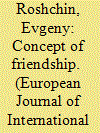| Srl | Item |
| 1 |
ID:
075744


|
|
|
|
|
| Publication |
2006.
|
| Summary/Abstract |
The present article seeks to draw attention to and explicate the concept of friendship in a discipline which has long ignored it: International Relations. It examines the ways in which major political thinkers and international treaties addressed the concept in the process of the emergence of the Westphalia state system. The article traces correlative changes between the shift from vertical to horizontal friendship and the emergence of internal and external princely sovereignty which signified the new era in international politics. It argues that the recognition of formally equal statuses of political friends prepared the grounds for the regime of external sovereignty. It also suggests that friendship was a key concept describing political order, included or not in the friend/enemy antithesis, in early Modernity. The subsequent ambiguity of the modern concept of friendship in international politics springs from its constant reinterpretation in the context of royalist and republican ideological polemics.
|
|
|
|
|
|
|
|
|
|
|
|
|
|
|
|
| 2 |
ID:
101837


|
|
|
|
|
| Publication |
2011.
|
| Summary/Abstract |
This article focuses on the use of the concept of friendship in the treaties of friendship concluded by the United Kingdom and the Soviet Union in the twentieth century. The range of reference of friendship and its usage by these two political rivals display a number of commonalities, which indicate a key role this concept plays in maintaining the existing order of interstate relations. The concept is conventionally used in the treaties marking the changes in the global or regional political settings. In the texts of these treaties appeals to friendship are made together with the expression of respect for state sovereignty, independence, borders and so on. It also appears as an exclusive and contractual relationship. These conventions in diplomatic rhetoric, meant to reassert and legitimize the particularistic sovereign order, pose a challenge to the attempts to conceive of international relations in terms of friendship as an ethical, universal and benevolent phenomenon.
|
|
|
|
|
|
|
|
|
|
|
|
|
|
|
|
| 3 |
ID:
151653


|
|
|
|
|
| Summary/Abstract |
This article asks when, how, and why states started to use the concept of international community in the shared language of diplomacy and international law. It argues that the concept was accepted to the interstate language as a result of debates over international institutions, which were to acquire a universal character, at the Hague Conferences of 1899 and 1907. The article suggests that conceptual changes in interstate language should be understood as products of rhetorical power struggles, in which some arguments lose the battle while others prevail, some concepts are discarded while others modified. The article suggests a model of conceptual change that explains an innovation in interstate language. First, it draws attention to collective assertive speech acts at diplomatic events that signal changes in international politics. Second, it examines whether such acts implicate conceptual innovations. Third, it posits that the composition of epistemic community assembled at the Hague determines the nature of conceptual innovation. Fourth, it demonstrates how rhetorical interventions into debates at the conference introduce and mould relevant concepts. Fifth, it illuminates how contextualisation of the conference interventions in professional debates helps us understand the polemical nature of arguments and the scope of conceptual innovation.
|
|
|
|
|
|
|
|
|
|
|
|
|
|
|
|